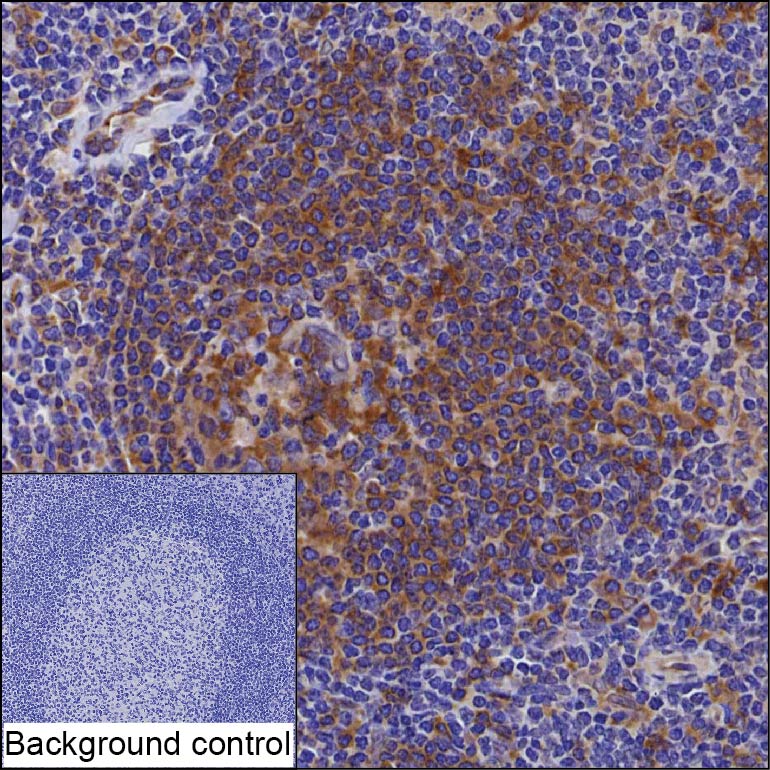
| WB | 咨询技术 | Human,Mouse,Rat |
| IF | 咨询技术 | Human,Mouse,Rat |
| IHC | 1/100-1/200 | Human,Mouse,Rat |
| ICC | 技术咨询 | Human,Mouse,Rat |
| FCM | 咨询技术 | Human,Mouse,Rat |
| Elisa | 咨询技术 | Human,Mouse,Rat |
| Host/Isotype | Mouse IgG2b |
| Antibody Type | Primary antibody |
| Storage | Store at 4°C short term. Aliquot and store at -20°C long term. Avoid freeze/thaw cycles. |
| Species Reactivity | Human |
| Immunogen | Purified recombinant fragment of human PIK3AP1 |
| Formulation | Purified antibody in PBS with 0.05% sodium azide |
+ +
以下是关于PIK3AP1抗体的3篇文献摘要信息,供参考:
---
1. **文献名称**: *PIK3AP1 deficiency inhibits human B-cell development and activation*
**作者**: Conley ME, et al.
**摘要**: 该研究利用抗PIK3AP1抗体分析其在B细胞中的表达及功能,发现PIK3AP1缺陷导致PI3K信号通路异常,抑制B细胞发育和活化,揭示了其在适应性免疫中的关键作用。
---
2. **文献名称**: *The role of PIK3AP1 in LPS-induced inflammatory response*
**作者**: Li X, et al.
**摘要**: 通过Western blot和免疫沉淀技术,研究发现PIK3AP1抗体检测到其在巨噬细胞中高表达,并证实其通过调控TLR4-PI3K通路参与LPS诱导的炎症反应,为免疫治疗提供潜在靶点。
---
3. **文献名称**: *PIK3AP1 modulates T cell receptor signaling and autoimmunity*
**作者**: Okkenhaug K, et al.
**摘要**: 研究利用基因敲除小鼠模型和抗PIK3AP1抗体,发现PIK3AP1通过负向调节TCR信号通路防止自身免疫反应,其缺失导致过度活化的T细胞和自身免疫性疾病表型。
---
**备注**:若需获取全文或具体实验细节,建议通过PubMed或期刊官网检索标题/DOI。部分研究可能涉及抗体品牌或实验方法学描述(如流式细胞术、IHC等),可根据需求进一步筛选。
The PIK3AP1 antibody is a crucial tool for studying the role of Phosphoinositide-3-Kinase Adaptor Protein 1 (PIK3AP1), a signaling adaptor protein involved in regulating immune responses. PIK3AP1. also known as BCAP or B-cell adaptor for phosphoinositide 3-kinase, facilitates the activation of the PI3K-AKT signaling pathway by bridging cell surface receptors (e.g., TLRs, B-cell receptors) to the PI3K catalytic subunit. This pathway is essential for cellular processes like proliferation, survival, and differentiation, particularly in B-cells and innate immune cells. Dysregulation of PIK3AP1 is linked to immune disorders, inflammatory diseases, and cancers, making it a research focus in immunology and oncology.
Antibodies targeting PIK3AP1 enable the detection and quantification of the protein in various experimental settings, including Western blotting, immunohistochemistry (IHC), and flow cytometry. They are critical for investigating PIK3AP1’s expression patterns, post-translational modifications, and interactions with signaling partners. Validated antibodies help elucidate its regulatory mechanisms in health and disease, such as its role in immune tolerance or tumor microenvironment modulation. Researchers also utilize these antibodies in preclinical models to explore therapeutic targeting of the PI3K pathway. Specificity and validation (e.g., knockout controls) are essential to ensure reliability, given the pathway’s complexity and cross-reactivity risks. Overall, PIK3AP1 antibodies are indispensable for advancing insights into immune signaling and related pathologies.
×